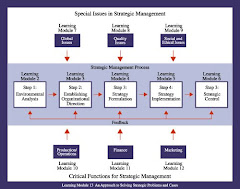Sunday, February 1, 2009
Don't copy your competitors (Except...)
Don't just copy successful competitors' corporate-level or business-level strategies. Unless they trip up, you'll always be a couple steps behind them. Discover untapped market segments rather than following competitors into crowded market segments. However, companies should definitely benchmark successful functional strategies, as long as these strategies fit into the company’s chosen corporate-level and business-level strategies.
Subscribe to:
Post Comments (Atom)

Example: Universal copied several of Disney’s operational strategies in developing Islands of Adventure, including immersive experience, convenient park design, etc. But instead of going after the same market segment, families with young children, they took their strengths (closer proximity to local population center, access to Spielberg’s film library for rides, etc.) to build a more mature experience that had more thrills.
ReplyDeleteShane,
ReplyDeleteAgree with your comment. However, I am curious what your thoughts are on Emerson's comment that if you 'build a better mousetrap, the world will beat a path to your door." Through the use of innovation and diligence, you can succeed in achieving a similar competitors corporate strategy with more efficiency or more profitability? Just a thought. Under your logic, no one should ever challenge companies with relatively standardized products?
Good point Matt; my post probably sounded like "NEVER copy business or corporate level strategies." But if a business is inefficient in catering to market segments, certainly another company could copy the company's corporate or business level strategies with a more efficient functional strategy. Maybe a better way to frame the answer is for companies to find the inefficiencies in the market.
ReplyDeleteI think that to copy the corporate strategy might be more of a stretch than copying business strategy. However, if a conglomerate is diversified into similar areas that allow for optimum synergies, it might make sense. To use the previous example, both Disney and Universal have Theme Parks, Movie and Television Studios, music labels, etc.
ReplyDelete